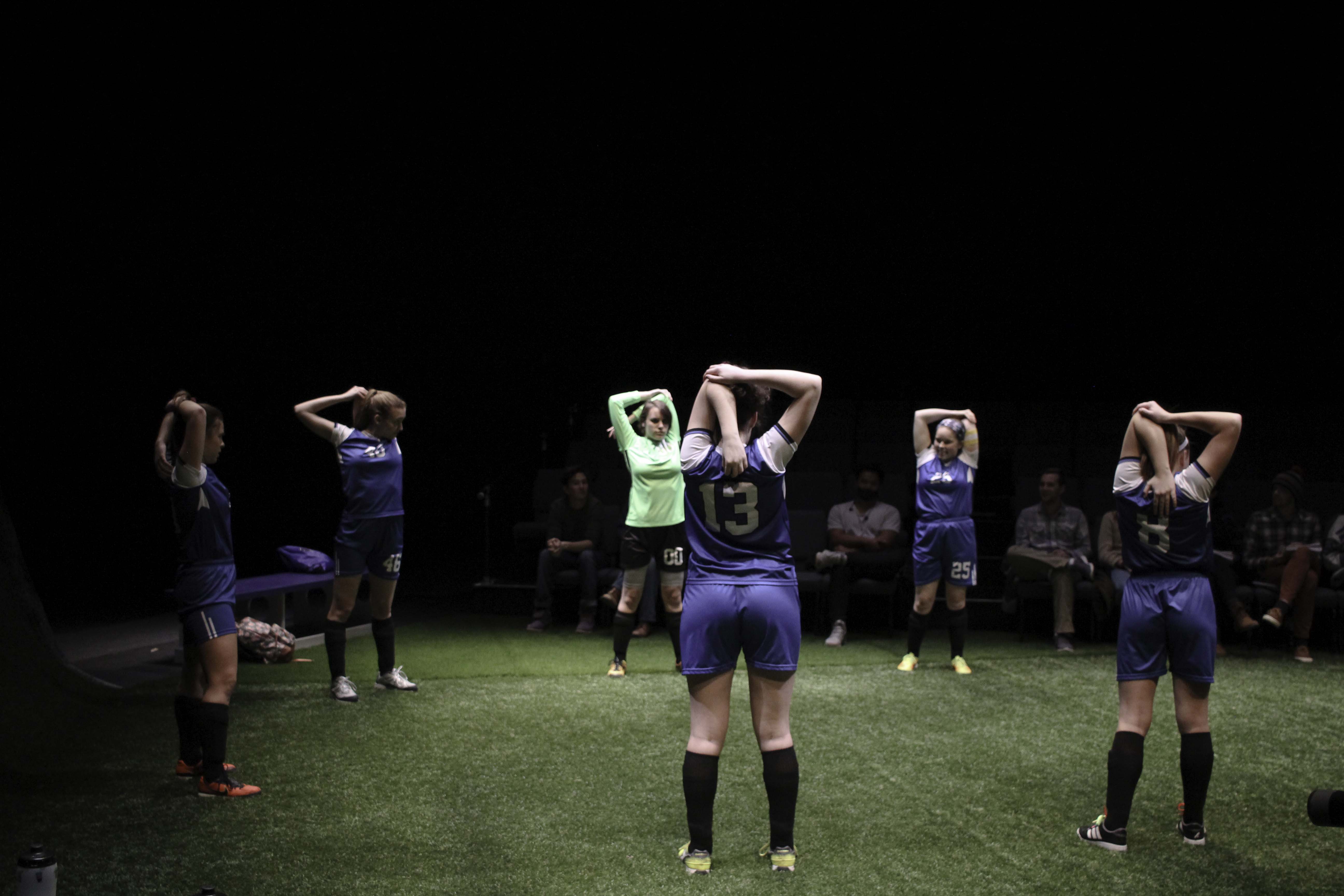Students performing in “The Wolves” stretch and talk about challenging topics among each other. Photo by Greg Clark.
URI theater department confronts emotional challenges in their production of ‘The Wolves’
Take teenage girls, add in drama, social issues and indoor soccer practices, put it on stage and you get a thrilling and intimate performance of “The Wolves.”
The University of Rhode Island’s theatre department has kicked off their 2019 spring season with Sarah DeLappe’s 2016 play, “The Wolves,” which centers around a group of high school junior girls and their warm ups before their indoor soccer games.
The characters are known by the numbers they wear on their jerseys and, from the beginning, the audience is completely immersed in their warm ups, watching the girls run around the astroturf set and kicking soccer balls. With the constant side conversations and movement, the intimate setting the J Studio provides is perfect for the audience to feel as though they are on the field with the players for those 90 minutes without intermission.
The girls of “The Wolves” led by team captain, No. 25, played by senior Madison Cook-Hines. They all have been playing together for years, except for the mysterious and foreign new girl, No. 46, played by Carleigh Boyle, who is the clear outsider of the group. She never seems to know the right thing to say and the team doesn’t let her forget it. No. 46 is constantly the butt of their jokes and they often make fun of her living situation, calling the yurt she lives in with her mother, “yogurt.”
However, No. 46 is not the only one having a hard time adjusting. The goalkeep, #00, played brilliantly by freshman Nina Carbone, has social anxiety disorder and throws up before every game. She is pictured as quiet, intense and focused, trying her hardest not to buckle under the pressure of being a goalkeeper and an apparent genius.
No. 7 hides behind humor an explosive personality to hide her trauma from two months ago that the team talks about behind her back. No. 2 is trying her hardest not to appear as the innocent, religious girl while hiding an eating disorder.
Despite all of the serious issues discussed, such as immigration, the Khmer Rouge, the ethics of imprisonment and genocide, and what all of the players are grappling with as they enter adulthood such as loss, teen pregnancy, abortion, eating disorders, sexual assault and sexism, the show is full of comedic moments.
Sophomore Mary Mullane’s character, No. 13, serves as great comedic relief, always the first to break the tension in the silent and intense moments. Mullane’s physical comedy is spot on and allows the audience and the characters room to breathe and laugh again.
While there are other characters talked about or referenced as being just offstage, there is not a single male character onstage and until the final emotionally charged moments of the play, there is not a single adult present. This allows the characters to be open and free with each other in a way that they would not be if these other characters were keeping an eye on them.
There are some negative sides to this, such as the constant bullying of No. 46 and the inappropriate use of language that the captain is always trying to curb but there is something special about seeing a group of girls interacting without those male and adult presences around.
To catch these actors in this hilarious yet emotionally charged play, there are performances in J Studio at the Fine Arts Center from Feb. 28 to March 2 at 7:30 p.m. and a 2 p.m. matinee show on March 3.

